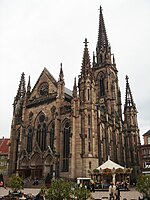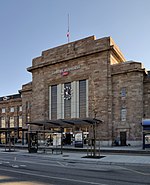Mulhouse

Mulhouse (pronounced [myluz] , in Alsatian Mìlhüsa [mɪlˈhyːsa] (German: Mülhausen [myːlˈhaʊzn̩] ); meaning "mill house") is a city of the European Collectivity of Alsace (Haut-Rhin department, in the Grand Est region of France), close to the Swiss and German borders. It is the largest city in Haut-Rhin and second largest in Alsace after Strasbourg. Mulhouse is known for its museums, especially the Cité de l'Automobile (also known as the Musée national de l'automobile, 'National Museum of the Automobile') and the Cité du Train (also known as Musée Français du Chemin de Fer, 'French Museum of the Railway'), respectively the largest automobile and railway museums in the world. An industrial town nicknamed "the French Manchester", Mulhouse is also the main seat of the Upper Alsace University, where the secretariat of the European Physical Society is found.
Excerpt from the Wikipedia article Mulhouse (License: CC BY-SA 3.0, Authors, Images).Mulhouse
Avenue Robert Schuman, Mulhouse
Geographical coordinates (GPS) Address Nearby Places Show on map
Geographical coordinates (GPS)
| Latitude | Longitude |
|---|---|
| N 47.75 ° | E 7.34 ° |
Address
Porte Jeune
Avenue Robert Schuman
68100 Mulhouse
Grand Est, France
Open on Google Maps









